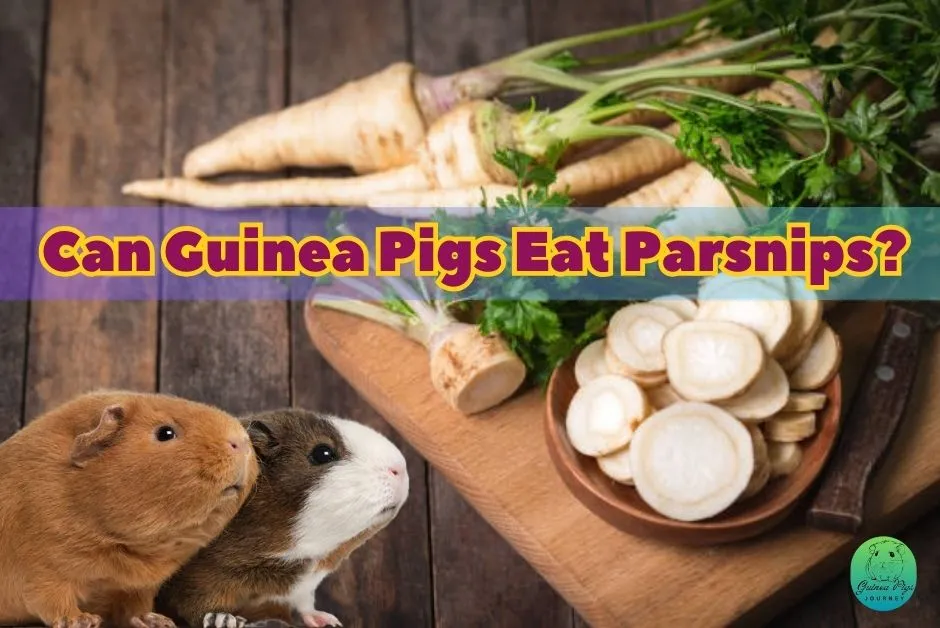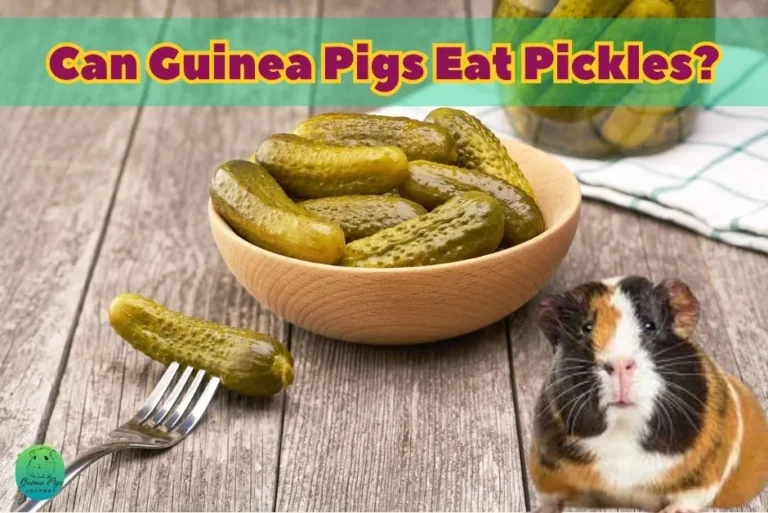Parsnips! A root vegetable closely related to carrots, beetroots, jicama, and parsley root, parsnips have long, cream-colored tuberous roots with a sweet, slightly nutty flavor. Parsnips are rich in nutrients and antioxidants that may improve immunity, aid weight loss, enhance digestive health, etc. But the question arises here: Are parsnips safe for guinea pigs or can guinea pigs eat parsnips?
Yes, guinea pigs can eat parsnips in moderation as an occasional treat and with the gradual introduction in limited quantities because other than the nutritional benefits, parsnips are high in acidity, calories, sugar, carbohydrates, salt, and a little calcium, and phosphorus content, which is of particular interest as far as guinea pigs health is concerned.
Always remember, moderation is the key to serving any food including parsnips for your guinea pigs’ overall health and long span life. So, feeding them the parsnips in a small quantity is important to avoid any hazardous conditions.
This long guinea pig journey has taught me to do proper research about any new food I decide to introduce into guinea pigs’ diet and the same has been done for parsnips. So, let’s quickly go through the nutritional benefits, risks, hazards, serving, and some important considerations about parsnips for guinea pigs.
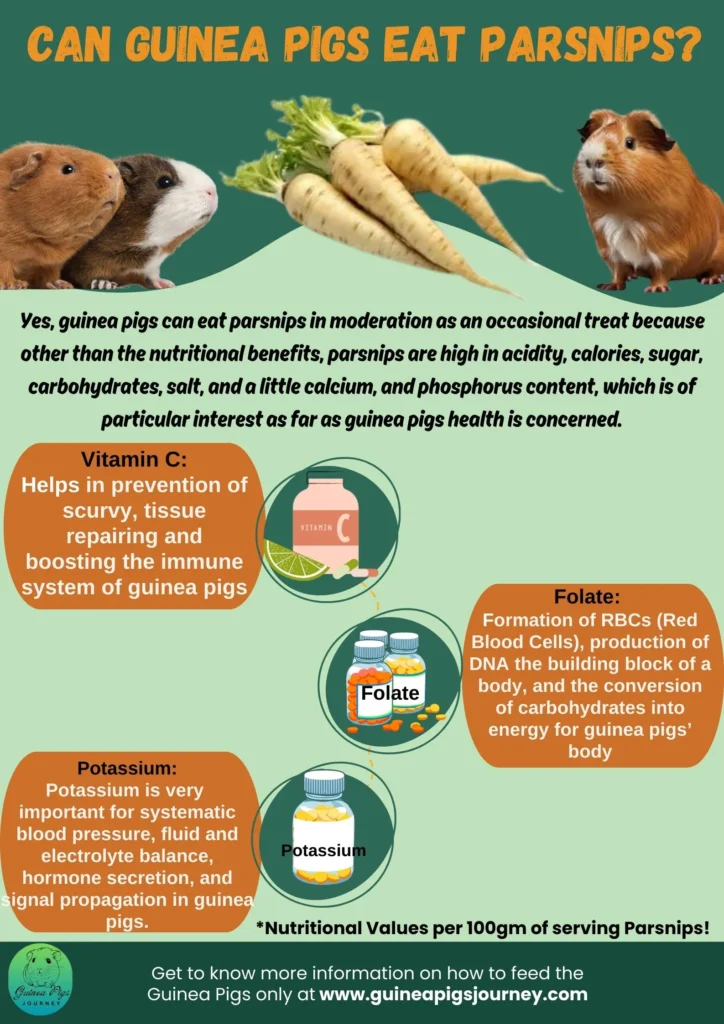
Nutritional Requirements of Guinea Pigs:
Guinea pigs have very delicate nutritional requirements and require a proper diet plan to fulfill their nutritional requirements to keep them healthy and happy for a longer time. In general, Guinea pigs require fresh quality hay which makes Up 80-90 % of most of their diet along with 10 % of fresh and good quality fruits and vegetables such as sugar snap peas, broccoli, Swiss chard, asparagus, arugula, dandelions, basil, rosemary, pears, honeydew melon, pomegranate, cherries, plums, etc. as a treat in moderation.
Guinea pigs can also be served with some amount of only dedicated guinea pig pallets but it should not be part of their main staple and should be served the recommended portion or mentioned on pallets bag for guinea pigs. Guinea pigs should also be served with fresh, clean, chlorine-free drinking water at all times and must be checked and changed twice a day for their good health.
You Can Also Read The Best Way To Feed And Serve Guinea Pigs (28 Easy Tips And Tricks)
The list of safe foods including parsnips for guinea pigs that can be fed is so long that it needs great care and understanding but not all foods your guinea pigs eat are safe like jalapenos peppers, pickles, cheerios, olives, meat, etc. and some are toxic, and harmful to their health. So, you must also know about those foods not recommended to feed guinea pigs for a safe and healthy life.
Parsnips for guinea pigs can be a nutritious addition if offered in moderation and limited quantity but at the same time, they can be harmful and dangerous with excessive feeding due to high amounts of sugar, carbohydrates, calories, calcium, phosphorus, etc. So, you must know the nutritional analysis of all parts of parsnips for guinea pigs so that you can decide on the quantity and portion of serving as well as the values and percentage of nutrients available with parsnips for guinea pigs to ensure moderation.
Nutritional Analysis of Parsnips for Guinea Pigs:
Parsnips are an excellent source of many important nutrients, packing a hearty dose of fiber, vitamin C, vitamin K, and folate, as well as several other important micronutrients into each serving. According to the USDA food database, Listed below are the nutritional values and percentages per 100 grams of raw parsnips for guinea pigs to understand the values and percentages of these important nutrients parsnips for guinea pigs contain and how much is required for your lovely pets for optimum health benefits.
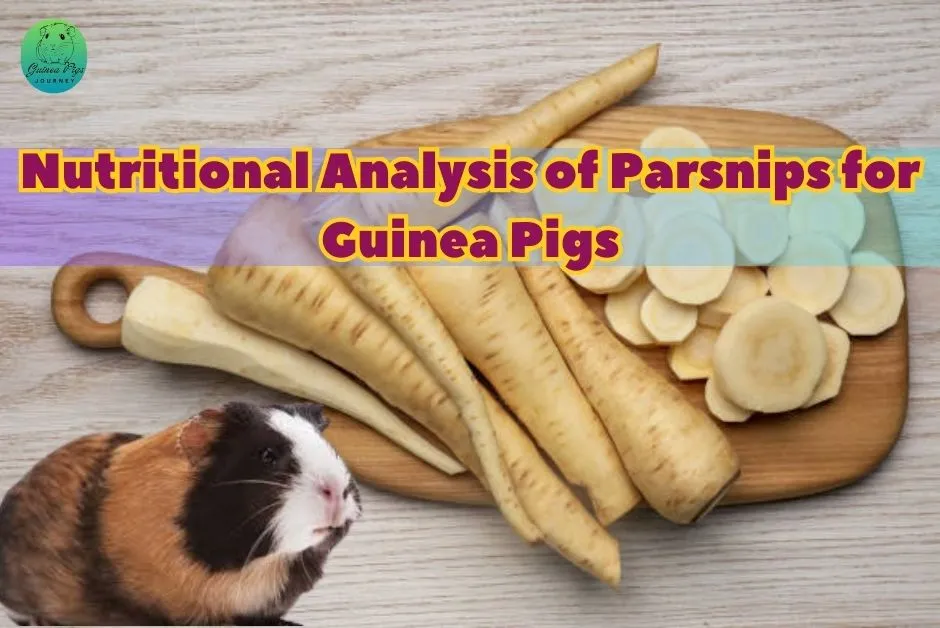
| Nutrients | Value per 100 grams | Daily Value / 100 gm. (DV %) |
| Calories | 75 kcal | |
| Carbohydrates | 18 grams | 7 % |
| Water | 79.5 grams | |
| Fat | 0.3 gram | 0 % |
| Protein | 2.57 grams | 2 % |
| Dietary Fiber | 4.9 grams | 18 % |
| Sugar | 4.8 grams | |
| Net Carbs | 4.04 grams | |
| Ash | 0.98 grams | |
| Vitamin C, total ascorbic acid | 17 mg | 19 % |
| Vitamin A, RAE | 0 µg | 0 % |
| Vitamin E | 1.49 mg | 10 % |
| Vitamin K | 22.5 µg | 19 % |
| Vitamin B-6 | 0.09 mg | 5 % |
| Vitamin D | 0 mcg | 0 % |
| Cholesterol | 0.00 mg | 0 % |
| Fatty Acid (Saturated) | 0.05 g | 0 % |
| Folate | 67 µg | 17 % |
| Calcium, Ca | 36 mg | 3 % |
| Phosphorus, P | 71 mg | 6 % |
| Potassium, K | 375 mg | 8 % |
| Iron, Fe | 0.59 mg | 3 % |
| Magnesium, Mg | 29 mg | 7 % |
| Manganese | 0.56 mg | 24 % |
| Zinc, Zn | 0.59 mg | 5 % |
| Sodium, Na | 10 mg | 0 % |
| Copper, Cu | 0.12 mg | 13 % |
Are parsnips safe for guinea pigs?
Yes, parsnips are safe to feed your guinea pigs in moderation but at the same time, it can be harmful to their overall health due to excessive feeding to your guinea pigs. Parsnips have some important minerals, vitamins, and antioxidants essential for their digestive health, immune system, and overall health function. Keeping in view the above nutritional chart it is safe to feed parsnips but in moderation because of the high value of carbohydrates, water, sugar, calcium, and phosphorus which can be considered bad in excess amounts for your guinea pigs’ health. So, let’s lighten the benefits and risks of these nutrients parsnips for guinea pigs.
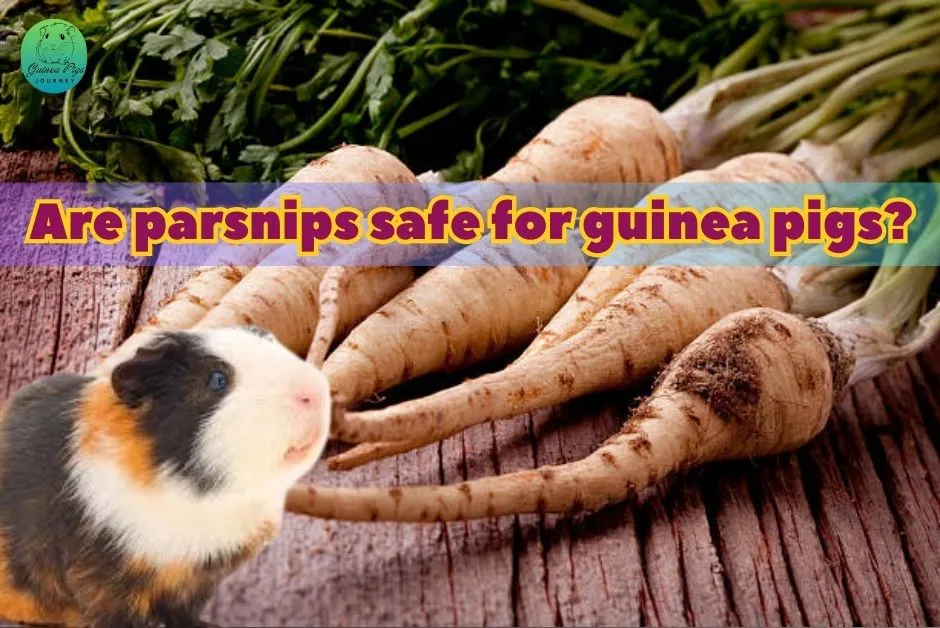
Antioxidants: Parsnips for guinea pigs supply some important antioxidants which are health-promoting compounds that help prevent oxidative stress and decrease damage to their cells and tissues. Antioxidants help to protect against chronic conditions like cancer, diabetes, and heart disease in guinea pigs.
Vitamin C: Parsnips for guinea pigs have a moderate amount of vitamin C that they cannot synthesize, necessary for their immune system and overall health function. Vitamin C protects guinea pigs from a dangerous disease known as scurvy which can even lead them to malnutrition. Parsnips containing vitamin C for guinea pigs also act as a powerful antioxidant. Vitamin C presence in parsnips for guinea pigs helps in the wound healing process.
Potassium: Parsnips for guinea pigs contain an important mineral known as potassium beneficial for lowering blood pressure, positively affecting heart health, preserving bone mineral density, and reducing the chances of formation of kidney stones. Potassium is also very useful for nerve and muscle function to maintain good health at whatever stage guinea pigs are. Potassium also regulates the heartbeat and oxygen support for guinea pigs and helps create proteins and carbohydrates in humans and animals. There are 375 mg of potassium per 100-gram serving parsnips for guinea pigs.
Fiber: Parsnips for guinea pigs are a great source of both soluble and insoluble fiber. Fiber moves through their gastrointestinal tract undigested, helping to get things moving and optimizing digestive health in guinea pigs. Fiber in parsnips for guinea pigs has been shown to support blood sugar control, reduce cholesterol levels, lower blood pressure, Support heart Health, and decrease markers of inflammation.
Folate: Parsnips for guinea pigs are a good source of folate, one of the B vitamins important for their tissue growth and cell function. It also converts carbohydrates into energy and helps in the formation of Red Blood Cells (RBCs). Pregnant guinea pigs at the infant stage require more folate to perform well. Parsnips for guinea pigs contain 67 µg folate per 100-gram serving.
What Are The Risks Of Parsnips For Guinea Pigs?
Although parsnips are safe to feed your guinea pigs, there are some risk factors associated with the overfeeding of parsnips to your guinea pigs. So, it is important to note these factors while considering offering parsnips to your guinea pigs.
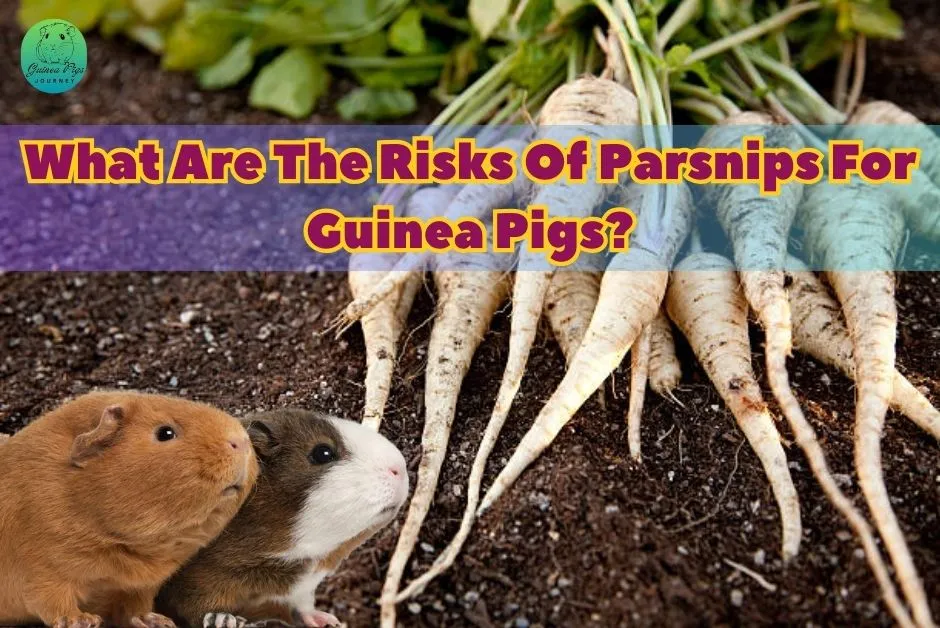
Digestive Upset: Parsnips for guinea pigs have a decent amount of sugar, minerals, and other nutrients which in excessive amounts can be dangerous for the sensitive digestive system of your guinea pigs which can lead to digestive upset and stomach issues. As we know our little furry friends cannot go well with food high in sugar, fat, and carbohydrates, so ensuring moderation and proper serving is very crucial.
Urinary Tract Issues or Oxalate Content: Parsnips have a very decent amount of calcium content which can be a factor for urinary problems because calcium contributes to the formation of bladder or kidney stones in guinea pigs mostly in adult guinea pigs adult guinea pigs need less calcium as compared to young guinea pigs. Calcium can also cause urinary tract issues which can be very painful for your guinea pigs causing pain in the kidneys, bleeding in their pee, or urinary tract upset.
High in Sugar and Carbohydrates: Parsnips are slightly high in sugar which in excessive feeding can cause digestive issues. Guinea pigs cannot perform well with a diet high in sugar and carbohydrates which can be very dangerous for their overall health causing dental problems, digestive issues, obesity, weight gain, and even leading to diabetes.
Allergic Reactions: Guinea pigs are very sensitive creatures and they are prone to allergies as well which is also a great concern when offering any new food including parsnips for guinea pigs’ diet. Always monitor their reactions while feeding any new food as it can cause irritation and allergic reaction.
Pesticides and Chemicals: parsnips can have some pesticides unwanted chemicals, and fertilizers sprayed during harvesting and in stores. It is recommended to thoroughly wash the parsnips or any part you are going to feed your pet. It is also recommended that buy parsnips for guinea pigs from any verified dealer or store having a non-GMO label to ensure a safe product for your guinea pigs.
How Often Can Guinea Pigs Eat Parsnips? (Frequency and Size of Serving Parsnips)
Parsnips for guinea pigs are not the part of main staple and regular diet and they should be fed in small quantities and as an occasional treat to keep them safe from any kind of hazardous conditions. The recommended frequency of feeding parsnips for guinea pigs is only once or twice a week at most in moderation to limit their consumption of parsnips.
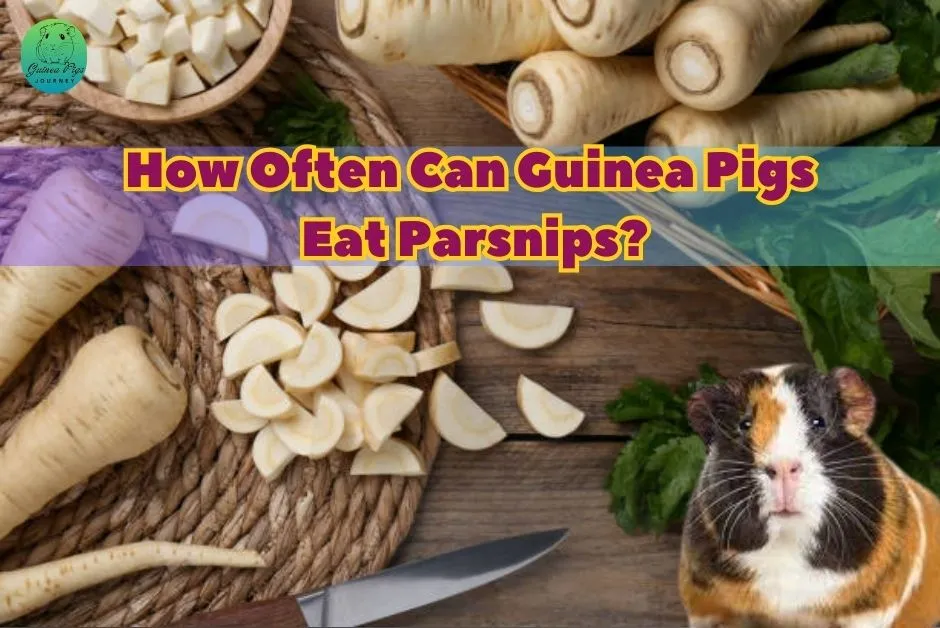
How Much Parsnips Can Guinea Pigs Have?
The recommended serving size is not more than about 100 grams at a time i.e. almost one or two quarter-inch slices of an average-sized parsnip per guinea pig. It is always suggested to feed your guinea pigs as they prefer to eat because individual preferences may vary in each guinea pig, so some prefer to eat the parsnips in pre-shredded form whereas others would love to nibble the chunks or slices, so it is up to your guinea pig preference.
It is important to wash properly in cold water before serving parsnips and peeling them is optional but look for any molded or wilted part to cut it out before serving. It is also important to cut or remove the top hard side to which greens or leaves are attached because it may be sour and hard for your guinea pigs which can be dangerous for them.
You can also serve ½ amount in the morning and the other half in the evening by mixing it with other suitable vegetables and leafy greens high in vitamin C and other important nutrients parsnips lack and have little amount like bell peppers, mustard greens, butternut squash, cilantro, green beans, radicchio, romaine lettuce, mushrooms, etc. in moderation and in small quantities to add a nutritional boost and variety to their diet.
Can Guinea Pigs Eat Parsnips Every Day?
No, parsnips are not a vegetable that can be served daily or as a regular diet, so do not offer parsnips to your guinea pigs every day and as a main staple as they contain oxalate, calcium, phosphorus, and high in sugar and carbohydrates which can contribute too many health risks and complications due to overconsumption like causing dental problems, digestive issues, obesity, weight gain, and even leading to diabetes, etc. It is recommended to feed parsnips as an occasional treat in moderation to ensure the good health of your guinea pigs.
Can Guinea Pigs Eat Parsnips Tops?
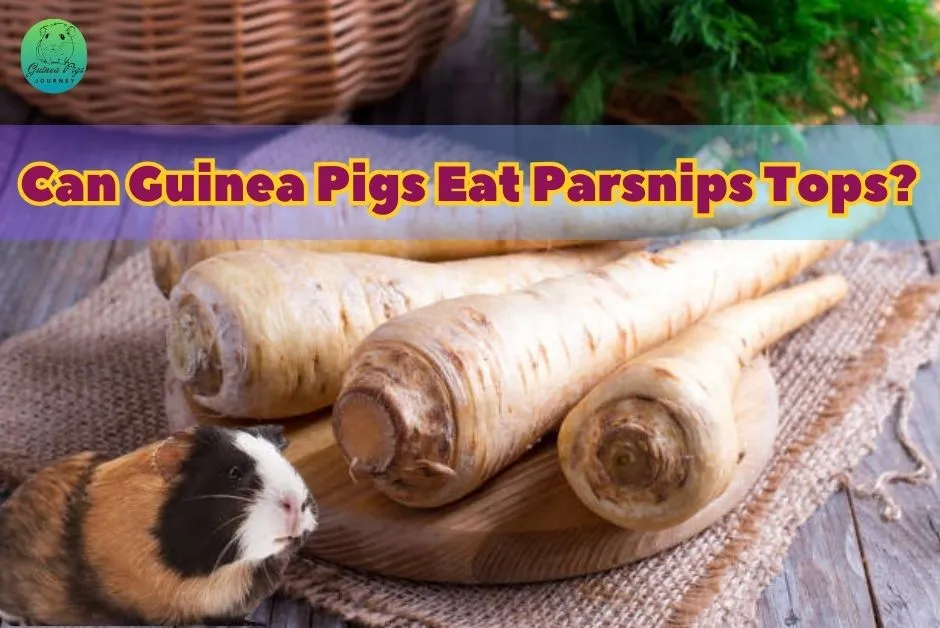
No, guinea pigs should not eat parsnips tops as these are so hard to digest by guinea pigs and also contain much oxalate and calcium that the parsnips, can lead to the formation of kidney and bladder stones, which makes it a no-feed option for guinea pigs diet. So, it is recommended to avoid feeding parsnip tops, just like carrots tops these are sour and bitter sometimes and your guinea pig may also dislike it while eating, so avoid feeding parsnip tops to your guinea pigs.
Can Guinea Pigs Eat Parsnips Peels or Skin?
Yes, parsnip skin or peel is safe to feed your guinea pigs in moderation and they can eat the parsnips with or without being peeled as per your guinea pig preference but before deciding to offer them the skin or peel of parsnip a root vegetable to furry friends it is important to wash them properly in cold running water to remove any kind of dust, chemicals, pesticides, etc to avoid any risk factor for them.
It is also important to watch for any kind of black or green spots on parsnips’ skin part and before offering them cut it out and do not feed your guinea pigs. Avoid feeding over wilted or molded parsnips as their skin or peel may be hard or tasteless for your guinea pigs, always choose fresh, raw, and organically produced parsnips for guinea pigs.
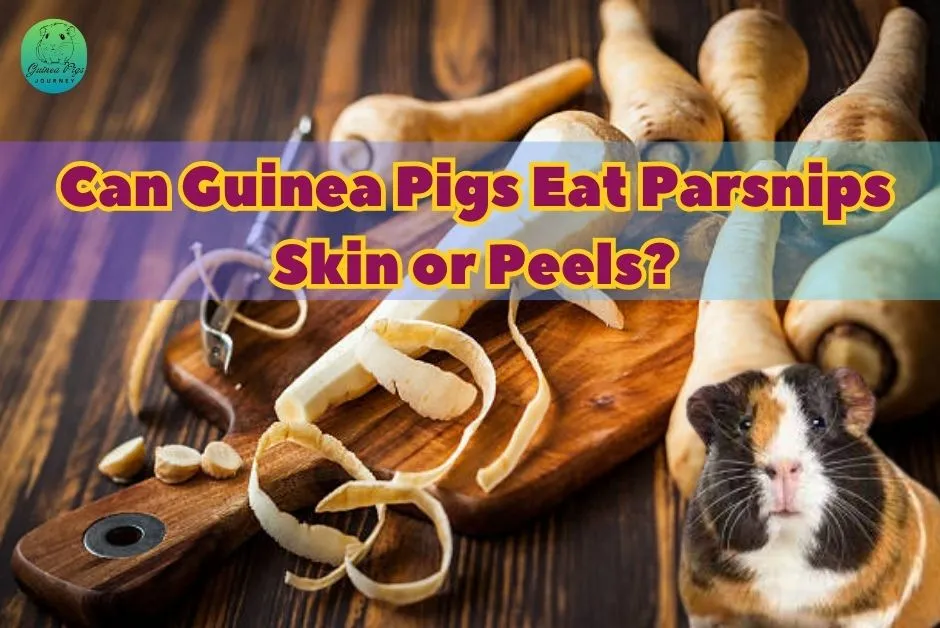
Can Guinea Pigs Eat Parsnips Leaves and Flowers?
No, avoid feeding the leaves and flowers of parsnips that contain a toxic sap on contact or when consumed can cause phytophotodermatitis resulting in severe burns, rashes, or blisters for your guinea pigs as well as humans. Leaves of parsnips are roughly hairy and have a pungent odor which would be disliked by your guinea pigs and can be harmful to their digestive health.
Can Guinea Pigs Eat Parsnips Greens?
No, it is not recommended to feed parsnip greens to your guinea pigs as it is toxic or allergic to your guinea pigs. Just like leaves and flowers, parsnips greens also cause phytophotodermatitis resulting in severe burns, rashes, or blisters for your guinea pigs.
Can Guinea Pigs Eat Parsnips and Swede?
Yes, guinea pigs can eat parsnips and swede mixed or with other suitable leafy greens or vegetables in moderation and with gradual introduction. It will add variety and nutritional boost to their overall health and diet plan. It is important to note that just like parsnips, swede should also be offered as an occasional treat and not as a main staple or regular diet because parsnips and swede both have similar nutritional values and excessive feeding can be harmful.
Can Guinea Pigs Eat Parsnips and Turnips?
Yes, guinea pigs can eat parsnips and turnips both mixed or with other suitable leafy greens or vegetables in moderation and with a gradual introduction. It is important to feed these vegetables in moderation and not as a regular diet because turnips are high in oxalate parsnips also have a decent amount of oxalate which can contribute to the formation of bladder or kidney stones. So, it is recommended to feed them both the parsnips and turnips in limited quantities to avoid any kind of hazardous situation.
Can Guinea Pigs Eat Wild Parsnips?
Although wild parsnips can be fed to your guinea pigs, I would not recommend you to feed the wild parsnips to your guinea pigs as there are many healthy alternatives like blackberries, grapefruit, dragon fruit, nectarines, pumpkin seeds, zucchini, wheatgrass, etc. instead of feeding wild parsnips to your guinea pigs. The leaves, stems, and flowers of wild parsnips for guinea pigs contain a toxic sap which on contact or when consumed can cause phytophotodermatitis resulting in severe burns, rashes, or blisters.
Intake of wild parsnip may negatively impact the weight gain and fertility in guinea pigs as well as humans. In some cases, guinea pigs consuming parsnip for the first time may also experience allergic conditions like dermatitis, bloating, gas, stomach cramps, and food allergy symptoms like burning, itching, and swelling of lips and tongue, redness in the eyes, and breathing difficulty. Hence, it is strictly advised to consult your veterinarian before adding this root vegetable to your guinea pig diet.
Conclusion: Prasnips for Guinea Pigs
Overall! It is OK to feed parsnips to your guinea pigs in moderation and remember it is not their regular food or main staple to be served daily. Avoid overfeeding the parsnips to your guinea pigs as it is high in sugar, and carbohydrates which can not be digested by your guinea pigs very easily and cause bloating, digestive and stomach upset,diarrhes, etc. Parsnips for guinea pigs are also slightly high in calcium, oxalic acid, and phosphorus which is not good in excess amounts that can contribute to the formation of kidney or bladder stones and cause problems in their urinary tract.

